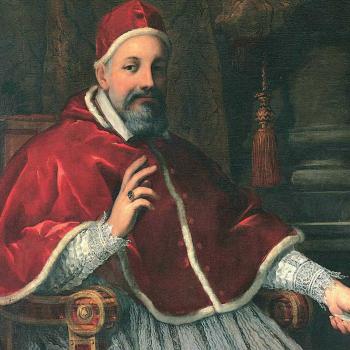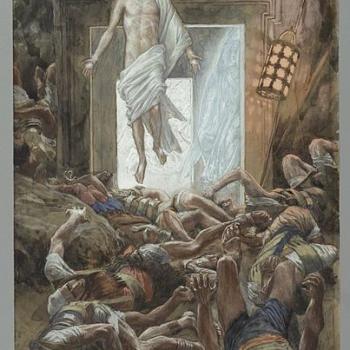Augustine returned to North Africa and was ordained bishop of Hippo in 395, an office he held until his death in 430. His was a time of political and theological unrest: barbarians pressed in upon the Roman Empire and sacked Rome itself in 410. Schism and dissension also threatened the Church. Augustine dove head first into the theological fray battling a number of heresies as well as his erstwhile allies, the Manichaeans. In combating Manichean dualism, Augustine repudiated their belief in evil as an active, separate, polluting force before which good is essentially passive. Instead, he asserted that evil is in reality a nonentity, a nothing, a veritable wasteland of the human spirit, an unbearable weightlessness of non-being.
However, promoting evil as a non-being was not to say it isn't real. The daily news and our own secret thoughts all testify to evil's dark presence. Augustine, however, maintained that evil's existence is not a function of its own energy and power. He wrote, "Evil has no existence except as a privation [a loss, a dispossession, an absence] of good." Calvin College's Cornelius Plantinga Jr. offers this interpretation: Evil (and synonymously sin) is a "parasite, an uninvited guest that keeps tapping its host for sustenance. Nothing about sin is its own; all its power, persistence and plausibility are stolen goods. It is a leech and a vandal. . . . Good, being from God, is original, independent and constructive; evil is derivative, dependent and destructive. To be successful, evil needs what it hijacks from goodness." Goodness is the food evil requires in order to be.
Think about the seemingly trivial example of going to the movies. You know how sometimes you can find yourself cheering for fleeing criminals, adulterous spouses, or skilled assassins? You find that you minimize or even hardly notice any of the damage, disturbance, or offenses caused by these characters you applaud. Why is that? Augustine would argue that what you cheer is not their evil but those features that evil has pirated from goodness: excitement, imagination, persistence, passion, and creativity. Regardless that everything sin touches begins to die; you do not focus on that. Instead you see only the vitality of the parasite, glowing with the life it has robbed.
Evil is consistently spoken of only in terms of what it is against. It is anti-law, anti-righteousness, anti-God, anti-life. It is deviant and perverse, an injustice or iniquity or ingratitude, disorder, disobedience, faithlessness, lawlessness, godlessness. It does not belong in God's world but has somehow gotten in. In fact it has dug in like a tick, only burrowing deeper as you try to remove it.
This stubborn and persistent feature of sin and evil can make it look as if it has a life of its own, as if it were an independent power of entity or even a kind of personality. Traditionally, this personification of evil is named Satan. He usually gets the blame for sin. Yet Augustine argues that evil is not incarnated, otherwise, God would have had to have made it. God made Satan all right, but not as evil. Augustine explained in his theological masterpiece, City of God, "The true Light, which lights every man that comes into the world -- this Light lights also every pure angel, that he may be light not in himself, but in God; from whom if an angel turn away, he becomes impure, as are all those who are called unclean spirits, and are no longer light in the Lord, but darkness in themselves, being deprived of the participation of Light eternal. For evil has no positive nature; but the loss of good has received the name ‘evil.'"
The devil may tempt you but he doesn't make you do anything. Rather, Augustine argued, acting out of your own free will, you willfully sin and consequently partake of this dearth, this dark absence named evil. You are the perpetrator. God neither suffers evil to be done, nor does God create wickedness in order to stir up some cataclysmic battle between the forces of good and evil. Instead evil, for Augustine, is the congealed result of your assent to temptation both in your overstepping the line of God's righteousness (a transgression) and failing to reach it (a shortcoming). Sinful human life is in its finality a caricature of human life as divinely designed. It cannot generate because it is degenerate. It reproduces only as it parasitically mocks and mimics in debased fashion the created intentions of God.
In his youth Augustine once famously stole fruit from a neighbor's pear tree, not to eat it, but only to taste it then throw it at the neighbor's pigs. An adolescent prank, yet Augustine saw it as evil's subversive encroachment and as a prelude to all sorts of wicked possibilities. Augustine writes, "What fruit had I then, wretched one, in those things which, when I remember them, cause me shame -- above all in that theft, which I loved only for the theft's sake? As the theft itself was nothing, how all the more wretched was I for loving it. Yet by myself alone I would not have done it, alone I could not have done it. I loved, then, in it the companionship of my accomplices with whom I did it. (Note here the emphasis on the debasing of community.) Had I at that time loved the pears I stole, and wished to enjoy them, I might have done so alone, if I could have been satisfied with the mere commission of the theft by which my pleasure was secured. But as my enjoyment was not in those pears, it was in the crime itself, which the company of my fellow-sinners produced.





